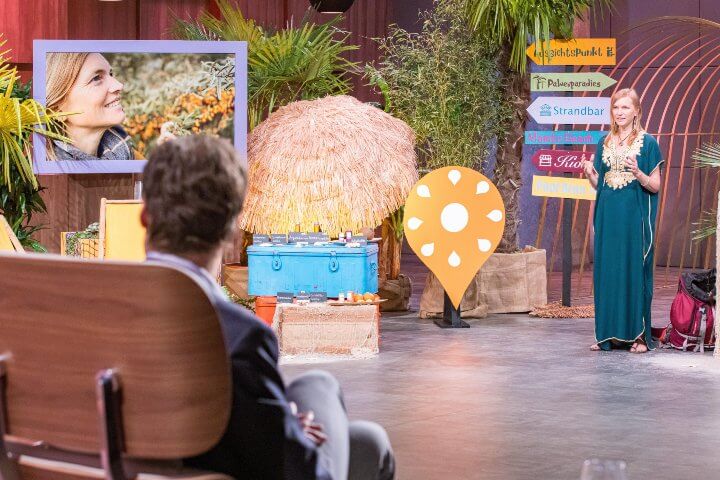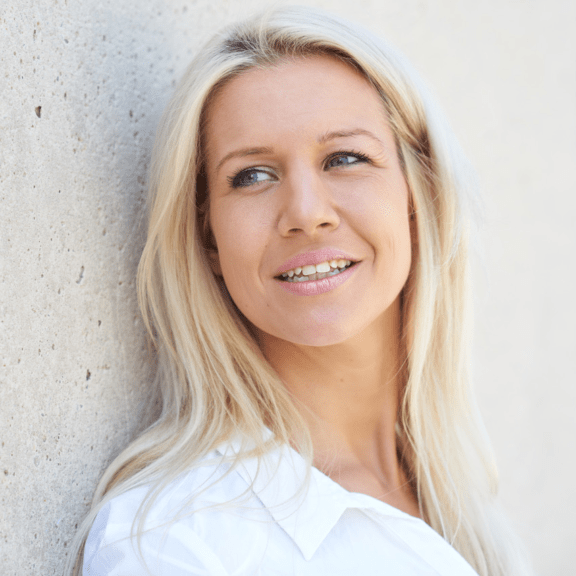Mon Courage: Can you build a startup remotely? #DHDL
On Monday's episode of ‘Die Höhle der Löwen’, founder Eva divides the well-known TV investors in several ways: first with regard to her brand, then on the question of whether it makes sense to build a startup while constantly travelling. The majority seem to be of the opinion that this is out of the question for founders. But are there really solid reasons behind this or simply outdated thought patterns?
Freitag,
06.06.2025

The stage design of the start-up ‘Moncourage’ already made it clear that it is all about travelling, and founder Eva starts her pitch by explaining that she has just arrived from Sri Lanka. And so she also explains that she herself had the problem of having too much ballast on her many journeys due to all the personal care containers, and also the danger of leakage always travelling with her.
That’s why she spent over a year searching the world for the best ingredients to develop solid all-in-one products with the perfect consistency from Alaska to the tropics. The result was a sun protection stick and a skincare stick that replaces lip balm, face cream, hand cream, body lotion, after-sun lotion and even make-up remover. The ingredients come from Equador, Mexico, the Philippines, Morocco and Brandenburg – the founder knows every single producer by name and has been shown the entire production process in detail.
This impressed the lions, as did her background as an expert in medicinal plants, aromatherapy and natural cosmetics.
The product is then also very well received by the lions, as is its margin and the turnover of almost €100,000 in one year to date.
But just as the viewers begin to think that the lions are about to make their first offer, the mood threatens to change.
First, Nils Glagau drops out because he cannot combine brand building with the idea of encouraging women to live their lives with skin care.
Carsten Maschmeyer makes a similar comment, although he initially speaks very favourably of the founder’s courage and her product.
But then the conversation quickly turns back to travelling and the lions ask several times whether founder Eva really has no fixed abode. She patiently explains the various facets of her life of constant travelling: that she has also searched for the best raw materials for her product, but that she has practically always felt at home anywhere in the world and has therefore structured her company from the outset in such a way that she does not necessarily always have to be in one place. But of course she can always go wherever she is needed.
But that’s not enough for Tillmann Schulz. He explains that, in his opinion, this is not possible in the start-up phase because you have to be available more quickly and therefore cannot be on the road. He firmly believes that it is essential to monitor production yourself, take samples and check other things.
Did he consider in all these remarks that the founder sources her raw materials from suppliers around the world and that perhaps it is precisely her constant travelling that allows her to carry out the required activities?
But Judith Williams also drops out for similar reasons: for her, a permanently travelling founder seems too complicated, she has probably had bad experiences with the combination across different time zones.
Of course, it is difficult to argue against the bad experiences of investors, as it is often not really possible to do anything about them.
But how rational is the argument?
If you take a look at the constantly growing and, above all, now highly professionalised scene of entrepreneurs among the ‘digital nomads’, it quickly becomes clear that long-term travel does not necessarily have to have a bad impact on a start-up. Many of these travelling founders are highly organised, used to adapting to specific time zones all over the world and often their partners, investors and customers don’t even notice where they are.
Many have a high degree of discipline – no wonder, after all, they often have to work in the most beautiful places while watching the holidaymakers idle away their time. There is a lively exchange among them – especially with regard to best practices or the most efficient technical solutions for every situation.
In view of the reality of these entrepreneurs, the blanket platitude ‘You can’t travel in the start-up phase’ seems more like a remnant from a very analogue world.
Ultimately, it is also Ralf Dümmel who gives this discussion the space it deserves – and pushes it to the margins. After all, he also prefers personal contact, but he knows that times have changed and that there are now the technical means to always be reachable anywhere else in the world.
He is now focussing on the product and the founder again, as both have completely won him over. So he finally makes an offer: he now wants 22% instead of the originally planned 15% for the requested €150,000 – but the founder happily accepts.
As a small speciality, she was advised by Judith Williams, which made Ralf Dümmel tremble briefly – but in the end everyone involved seemed very happy with the result.
A nice ending that is just the beginning. And once again a demonstration that investors are only human: some may miss opportunities due to bad experiences, some hold on to outdated beliefs – and some have the courage to arrive in the modern world to create something even greater.
We can only hope that this courage will be rewarded on all sides in this case.
Photo (above): TVNOW / Bernd-Michael Maurer

Ruth Cremer
Ruth Cremer ist Mathematikerin und Beraterin sowie Hochschuldozentin auf dem Gebiet der Geschäftsmodelle, Kennzahlen und Finanzplanung. Als ehemalige Investmentmanagerin weiß sie, worauf Investoren achten und hilft auch bei der Pitch- und Dokumentenerstellung im Investitions- oder Übernahmeprozess. Seit 2017 ist sie als externe Beraterin an der Auswahl und Vorbereitung der Kandidaten in "Die Höhle der Löwen" beteiligt.
